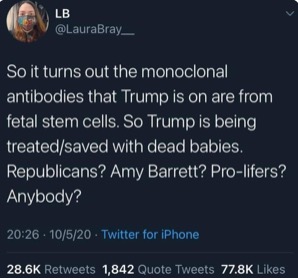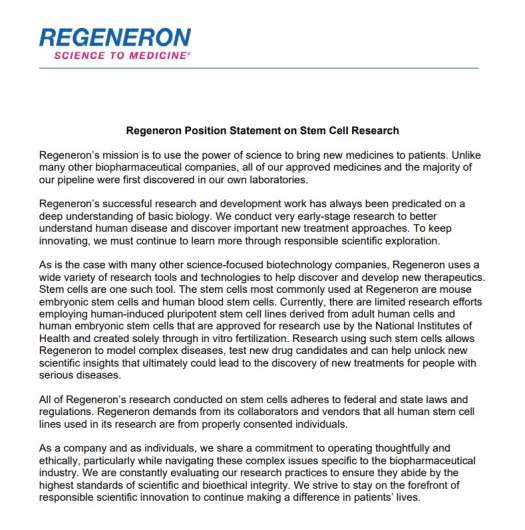
Rumors are circulating claiming that President Donald Trump‘s monoclonal antibody treatment from Regeneron was made with human fetal or embryonic stem cells. Regeneron told Heavy that their antibody cocktail was not developed using human fetal or embryonic stem cells, but it did use “immortalized epithelial cells” that were originally derived from human embryonic kidney cells at Stanford in the 1980s. Regeneron told Heavy that these were “immortalized epithelial cells” and not stem cells. These cells weren’t used to create the antibody cocktail itself, but they were used to test its potency. Those HEK293T cells were originally derived from fetal tissue from “a healthy aborted fetus of unknown parenthood,” according to the HEK293 website.
Here’s what you need to know:
REGN-COV2 Was Not Made With Human Stem Cells, Regeneron Says
Alexandra Bowie of Regeneron told Heavy that Regeneron did not create its REGN-COV2 treatment using human embryonic stem cells.
She wrote: “This particular discovery program (REGN-COV2) did not involve human stem cells or ESCs.”
According to a September 29 statement from Regeneron, the antibody cocktail has been shown to reduce viral load and alleviate symptoms in non-hospitalized patients. It’s showing positive trends in reducing medical visits, according to Regeneron. Regeneron wrote: “This trial is part of a larger program that also includes studies of REGN-COV2 for the treatment of hospitalized patients, and for prevention of infection in people who have been exposed to COVID-19 patients.”
The HEK 293T Cells Are ‘Immortalized Epithelial Cells,’ Not Stem Cells, Regeneron Says
Another question circulating involves the use of HEK293T cells in the production of the REGN-COV2 antibody cocktail. Two publications in Science Magazine discussed the creation of antibody cocktails for SARS-CoV-2 and mentioned HEK293T cells.
Bowie clarified for Heavy how the HEK293T cells were used:
They are referring to use of the 293T cell line, which was made at Stanford in the ‘80s and was originally derived from human embryonic kidney cells. These are immortalized epithelial cells – not stem cells. These are very commonly used cells in research, and most published research involves use of 293s. In our case, these 293T cells were transfected and used in production of a ‘pseudoparticle’ that mimics the virus’ Spike protein and allowed us to test neutralization ability of our antibodies against the virus.
The HEK 293T cells were used in testing the potency of the treatment, though not used in the development of the treatment itself.
Tests for the Potency of Regeneron’s Antibodies Used HEK 293T Cells
Regeneron told Technology Review that the HEK 293T cells weren’t used to create the antibody cocktail itself, but they were used to test the potency of the antibodies. The HEK 293T cells originated from kidney tissue from an abortion in the Netherlands in the 1970s. The cells have been dividing in a lab (thus “immortalized”) since the 1970s, Technology Review noted.
You can learn more about the HEK293 cell line here. The cells are commonly used in cancer research, for example. The HEK293 website notes the origin of the cell line:
The line was cultured by scientist Alex Van der Eb in the early 1970s at his lab at the University of Leiden, Holland. The transformation was executed by Frank Graham, another scientist Van der Eb’s lab who invented the calcium phosphate method for transfecting cells. The source of the cells was a healthy aborted fetus of unknown parenthood. The name HEK293 is thusly named because it was Frank Graham’s 293rd experiment.
You can see a description of the 293T cell line here, provided on the Millipore Sigma website. It notes:
293T cell line is a stable clone derivative of the human embryonic kidney (HEK) 293 cell line. It expresses the large T antigen of simian virus 40 (SV40)… The 293T cell line was created in the laboratory of Michele Calos by transfection of a sub-line of adenovirus-immortalized human embryonic kidney cells with a gene encoding the SV40T-antigen and a neomycin resistance gene. The cell line is competent for replication of vectors carrying the SV40 origin of replication. The line also has favourable tissue culture, transfection, DNA replication, gene expression, and protein production properties. It gives high titres when used to produce many viral vectors such as oncoretroviruses and lentiviruses… HEK293T is used for large-scale vector production, displays increased cell growth and is efficient for transfection experiments when compared to HEK293 cells.”
Regeneron told Technology Review and Heavy that many labs use these 293T cells to create virus-like particles with a spike protein similar to SARS-CoV-2. Bowie said that the cell lines aren’t considered fetal tissue because they are divided cells that grew from a cell line from the 1970s.
Bowie told Technology Review: “It’s how you want to parse it. But the 293T cell lines available today are not considered fetal tissue, and we did not otherwise use fetal tissue.”
Dr. Pamela Bjorkman, Professor of Biology and Biological Engineering at the California Institute of Technology, told Heavy: “It is accurate to say that the cell line was originally derived from human fetal tissue cells (HEK means human embryonic kidney), but these are NOT embryonic stem cells. They’ve been used for many research purposes, including early studies of gene expression, They are now mainly used to produce proteins, so my lab and many others use them to make a variety of proteins (in our case, mainly antibodies and viral proteins).”
Regeneron Issued a General Statement about Stem Cell Use in April
Some people misread a position statement on stem cell treatment released by Regeneron and misinterpreted it as being about the drug in particular. Bowie told Heavy that this was their general position on stem cell use and was not an indication of how that particular monoclonal antibody treatment was created.
Here’s a screenshot of one of the many rumors circulating on social media.
People are sharing posts with misinformation claiming that Trump’s monoclonal antibodies were made from fetal stem cells. This is not accurate. The treatment was not made from fetal stem cells. The efficacy of the antibodies were tested with a cell line that was originally derived from human fetal tissue cells.
Some of the rumors cite the position statement from Regeneron about stem cell research, which you can read here or below. This statement was released in April 2020.
The statement read, in part:
As is the case with many other science-focused biotechnology companies, Regeneron uses a wide variety of research tools and technologies to help discover and develop new therapeutics. Stem cells are one such tool. The stem cells most commonly used at Regeneron are mouse embryonic stem cells and human blood stem cells. Currently, there are limited research efforts employing human-induced pluripotent stem cell lines derived from adult human cells and human embryonic stem cells that are approved for research use by the National Institutes of Health and created solely through in vitro fertilization. Research using such stem cells allows Regeneron to model complex diseases, test new drug candidates and can help unlock new scientific insights that ultimately could lead to the discovery of new treatments for people with serious diseases.
All of Regeneron’s research conducted on stem cells adheres to federal and state laws and regulations. Regeneron demands from its collaborators and vendors that all human stem cell lines used in its research are from properly consented individuals.
George D. Yancopoulos, M.D., Ph.D. and president and chief scientific officer of Regeneron, talked about the new antibody cocktail in a September 24 press statement. He said, in part:
The greatest treatment benefit was in patients who had not mounted their own effective immune response, suggesting that REGN-COV2 could provide a therapeutic substitute for the naturally-occurring immune response. These patients were less likely to clear the virus on their own, and were at greater risk for prolonged symptoms. We are highly encouraged by the robust and consistent nature of these initial data, as well as the emerging well-tolerated safety profile, and we have begun discussing our findings with regulatory authorities while continuing our ongoing trials. In addition to having positive implications for REGN-COV2 trials and those of other antibody therapies, these data also support the promise of vaccines targeting the SARS-CoV-2 spike protein.
READ NEXT: The latest COVID-19 deaths, cases and updates

